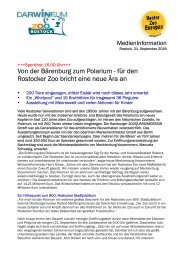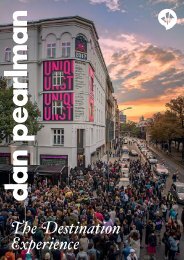danzine_TheNewWorkExperience_Web
You also want an ePaper? Increase the reach of your titles
YUMPU automatically turns print PDFs into web optimized ePapers that Google loves.
INTERVIEW<br />
INTERVIEW<br />
THE CULTURE<br />
OF WORK<br />
DAN PEARLMAN — THE NEW WORK EXPERIENCE<br />
CREATING CORPORATE CULTURE<br />
Marcus Fischer, Creative Director at<br />
dan pearlman Group and Professor for<br />
Brand Management about the meaning<br />
of a holistic corporate culture<br />
What exactly does “The Culture of<br />
Work” express?<br />
Generally, the involvement of employees<br />
in a company creates the overall<br />
structure. Employees shape values<br />
with their work and crucially contribute<br />
to the value of a company. How<br />
successfully they increase a company’s<br />
value with their work no longer<br />
depends solely on the salary’s amount,<br />
but on how they value their own work.<br />
Thus, the employee defines the value<br />
of one's own actions and finally the<br />
value of one's self. Companies can<br />
not win the battle for the best minds<br />
by offering money only. They have to<br />
offer their employees business goals<br />
that align with their identity and which<br />
makes them want to act as a brand<br />
ambassador.<br />
How can companies achieve this?<br />
Companies in mature markets may no<br />
longer rely only on maximizing profits.<br />
They need goals that create meaning<br />
and stand for a positive system of values.<br />
Here, we feel an ethical responsibility<br />
of businesses to give society<br />
something back. This responsibility<br />
could even be understood as an entrepreneurial<br />
duty, especially for globally<br />
present companies. Being Internal<br />
Branding & New Work Specialists, we<br />
elaborate those strategies together<br />
with the company, which then serves<br />
as an internal branding and corporate<br />
culture campaign able to involve all<br />
their employees. We know that investing<br />
in the employees means investing<br />
in the brand’s value and therefore investing<br />
in the company’s value. Every<br />
measure aiming for internal branding<br />
and corporate culture is better than<br />
none.<br />
Doesn’t corporate culture<br />
mainly refer to beautiful workspaces?<br />
First of all, the three major atmospherical<br />
themes light, air, and noise<br />
play a big role in expressing appreciation<br />
toward the employees. A good<br />
start is when the workspace meets<br />
the employees’ needs, the physiological<br />
needs, and the legal framework<br />
is fulfilled. Putting functionality aside,<br />
people of course prefer working at<br />
a well-designed, well-organized and<br />
well-equipped place, which focuses<br />
on the employees’ needs. Thereby the<br />
spatial experience and the behavior<br />
are strongly connected. What has to<br />
be created is an overall concept of<br />
identity which suits the brand and can<br />
be recognized throughout<br />
the space.<br />
Will the digitalization make work<br />
environments superfluous?<br />
Surely digitalization will have a strong<br />
impact on the future of work. Analogue<br />
and digital will merge into one<br />
hybrid space including an increase of<br />
neurological interfaces. Nevertheless,<br />
people live in a physical world. They<br />
long for real experiences. Inspiration<br />
and creativity mainly rise due to real<br />
encounters. Because of this, employees<br />
will continue working in physical<br />
locations. It is important to cultivate<br />
this kind of working culture.<br />
DAN PEARLMAN — THE NEW WORK EXPERIENCE<br />
56<br />
INTERVIEW<br />
INTERVIEW<br />
57
















